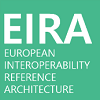
Covered by:
| Recommendation 15 |
Define a common security and privacy framework and establish processes for public services to ensure secure and trustworthy data exchange between public administrations and in interactions with citizens and businesses. Supporting Solutions |
| Legal initiative | Description | Recommendation |
|
Status: In force |
The General Data Protection Regulation (GDPR) allows European Union (EU) citizens to better control their personal data. It also modernises and unifies rules allowing businesses to reduce red tape and to benefit from greater consumer trust. The GDPR is part of the EU data protection reform package, along with the data protection directive for police and criminal justice authorities. |
Recommendation 15 |
|
Status: Legislative Proposal |
This Proposal aims at creating a legislative framework for the governance of common European data spaces. It proposes measures: - to unlock more publicly held data for research serving the common good; - to support voluntary data sharing by citizens (‘data altruism’); and - to set up an EU-level governance structure to prioritise standardisation needs and improve data interoperability. |
Recommendation 15 |
|
Status: In force and transposed |
The legislation specifies that when national authorities use public procurement to invite tenders to provide works, supplies or services, they must treat all applicants equally and not discriminate between them. They must also be transparent in their dealings. | Recommendation 15 |
|
Status: In force and transposed |
The Electronic Identification and Trust Services (eIDAS) Regulation creates a new system for secure electronic interactions across the EU between businesses, citizens and public authorities. It aims to improve trust in EU-wide electronic transactions and to increase the effectiveness of public and private online services and e-commerce. It applies to: - electronic identification (eID) schemes notified to the European Commission by EU countries; and - trust service providers based in the EU. It removes existing barriers to the use of eID in the EU. For instance, it would now be straightforward for a Portuguese firm to tender for a public service contract in Sweden, while EU funding grants can be managed wholly online. A revision of the eIDAS Regulation has been proposed, see: Proposal for a Regulation of the European Parliament and of the Council amending Regulation (EU) No 910/2014 as regards establishing a framework for a European Digital Identity, URL: https://op.europa.eu/en/publication-detail/-/publication/5d88943a-c458-… |
Recommendation 15 |
|
Short title and title: Commission Implementing Regulation (EU) 2015/1501 - eIDAS Regulation Status: In force and transposed |
This Regulation lays down technical and operational requirements of the interoperability framework in order to ensure the interoperability of the electronic identification schemes which Member States notify to the Commission. | Recommendation 15 |
|
Status: In force and transposed |
The aim of this directive is to set out the conditions under which a patient may travel to another EU country to receive safe and high-quality medical care and have the cost reimbursed by their own health insurance scheme. It also encourages cooperation between national healthcare systems. |
Recommendation 15 |
|
Status: In force |
This regulation aims to improve checks at the EU’s external borders, allow for better detection of security threats and identity fraud, and help in preventing and combating illegal immigration. | Recommendation 15 |
|
Status: In force and transposed |
This Directive sets out rules to ensure security in the processing of personal data, the notification of personal data breaches, and confidentiality of communications. It also bans unsolicited communications where the user has not given their consent. | Recommendation 15 |
|
Status: In force and transposed |
This Directive proposes a wide-ranging set of measures to boost the level of security of network and information systems (cybersecurity) to secure services vital to the EU economy and society. It aims to ensure that EU countries are well-prepared and are ready to handle and respond to cyberattacks through: - the designation of competent authorities, - the set-up of computer-security incident response teams (CSIRTs), and - the adoption of national cybersecurity strategies. - It also establishes EU-level cooperation both at strategic and technical level. Lastly, it introduces the obligation on essential-services providers and digital service providers to take the appropriate security measures and to notify the relevant national authorities about serious incidents. |
Recommendation 15 |
|
Status: In force and transposed |
E-invoicing by a business in one EU country for work done for or goods delivered to a public authority in another has been hampered by problems of a lack of interoperability, i.e. incompatible e-invoicing systems in different countries. The law applies to invoices falling within the scope of the public procurement directives (i.e. most contracts) but does not apply to contracts falling within the scope of Directive 2009/81/EC in the fields of defence and security, where the procurement and performance of the contract are declared to be secret or must be accompanied by special security measures. |
Recommendation 15 |
|
Status: In force and transposed |
This Directive aims to better protect individuals’ personal data when their data is being processed by police and criminal justice authorities. It also aims to improve cooperation in the fight against terrorism and cross-border crime in the EU by enabling police and criminal justice authorities in EU countries to exchange information necessary for investigations more efficiently and effectively. The Data Protection Directive for Police and Criminal Justice Authorities is part of the EU data protection reform package along with the General Data Protection Regulation (Regulation (EU) 2016/679). | Recommendation 15 |
| Short title: Regulation on Interoperability in the field of justice, freedom and security Title: Regulation (EU) 2019/817 of the European Parliament and of the Council of 20 May 2019 on establishing a framework for interoperability between EU information systems in the field of borders and visa and amending Regulations (EC) No 767/2008, (EU) 2016/399, (EU) 2017/2226, (EU) 2018/1240, (EU) 2018/1726 and (EU) 2018/1861 of the European Parliament and of the Council and Council Decisions 2004/512/EC and 2008/633/JHA |
It aims to to improve checks at the EU’s external borders, allow for better detection of security threats and identity fraud, and help in preventing and combating illegal immigration. | Recommendation 15 |
| Solution | Description | Associated Recommendation |

CEF Big Data Test Infrastructure |
Big data test infrastructure (BDTI) helps public administrations improve the experience of the citizen, make government more efficient and boost business and the wider economy through big data. Big data is high-volume, high-velocity and high-variety information that requires new forms of processing to enable enhanced decision-making, insight discovery and process optimisation. | Recommendation 15 |

CIRCABC |
CIRCABC (Communication and Information Resource Centre for Administrations, Businesses and Citizens) is an open-source, web-based application which enables geographically spread collaborative groups to share information and resources in private workspaces. | Recommendation 15 |

Data models |
The use of CISE specifications and data models, helps to ensure that public administrations are taking into account relevant EU recommendations on standards and specifications in the maritime domain and are seeking to make the approach consistent across borders. | Recommendation 15 |

eDelivery |
The eDelivery Building Block helps public administrations to exchange data and documents via AS4 Access Points, based on the AS4 messaging protocol. This allows different parties to exchange electronic data and documents across sectors and borders through a secure eDelivery message exchange network. By connecting to an AS4 Access Point, a public administration can exchange electronic data and documents with any organisation connected to another Access Point in the network. The eDelivery Building Block also helps upgrade exisiting solutions so they can connect to eDelivery messaging networks through an Access Point. | Recommendation 15 |

eIDc |
The eID Building Block allows public administrations and private service providers to easily extend the use of their online services to citizens from other Member States, in line with the eIDAS Regulation. | Recommendation 15 |

|
The European Interoperability Reference Architecture (EIRA©) is an architecture content metamodel defining the most salient architectural building blocks (ABBs) needed to build interoperable e-Government systems. The EIRA© provides a common terminology that can be used by people working for public administrations in various architecture and system development tasks. The EIRA© was created and is being maintained in the context of Action 2016.32 of the ISA² Programme. The EIRA uses (and extends) the ArchiMate language as a modelling notation and uses service orientation as an architectural style. | Recommendation 15 |

eSignature |
The CEF eSignature Building Block allows public administrations, businesses, and citizens to electronically sign any document, anywhere in Europe, at any time, in line with the eIDAS Regulation for e-signatures, e-seals and related services offered by Trust Service Providers. | Recommendation 15 |

eTrustEx open source software package |
A cross-sector, open source tool that will help you to exchange structured and unstructured documents and to connect to pan-European e-delivery infrastructures with reduced investment. | Recommendation 15 |
|
European Union |
The European Union Location Framework (EULF) Blueprint is a framework of recommendations and related guidance for publishing and using location information and applying interoperability principles in digital government. The EULF Blueprint was initially developed through the EULF project in the ISA programme. The content has been updated extensively through the European Location Interoperability Solutions for e-Government (ELISE) project, which is part of the ISA2 programme. | Recommendation 15 |

Service model |
The CISE Network is a complex open computer network interfacing several EU countries, specifically, in the maritime data context. This network connects CISE nodes and legacy systems thought a special component called "The CISE Adaptor". This document is a guideline to the CISE Service Model and to the software development of the CISE Adaptors. The intention is to provide a complete, precise and quick start documentation to be used fundamentally as a reference guide by the CISE Software Developers community of the EU Member States. Specifically, the objective is to make more easy the development, test, implementation and validation of CISE Adaptors. |
Recommendation 15 |
|
IMAPS solution v1.2 |
IMAPS is a user-friendly online questionnaire, designed as a self-assessment tool to assist public service owners to evaluate key interoperability aspects of their digital public service. Not only can IMAPS be used to assess the interoperability of any public service – from open data portals, and e-voting platforms, to public procurement services, and much more – it is applicable to services at all levels of government (international, national, regional and local). |
Recommendation 15 |
|
LIMAPS v1.0.0 |
This is the Beta version of the Legal Interoperability Maturity Assessment of a Public Service (LIMAPS) survey. This Beta version of the LIMAPS Survey has been released on the 21 April 2020 on Joinup. It is a user-friendly online questionnaire, designed as a self-assessment tool to assist public service owners to evaluate key legal interoperability aspects of their digital public service. The current Beta version of LIMAPS (LIMAPS v1.0.0 Beta) is available at the EU survey portal: https://ec.europa.eu/eusurvey/runner/limaps-beta. |
Recommendation 15 |

|
PM² is a Project Management Methodology developed and supported by the European Commission. Its purpose is to enable project teams to manage their projects effectively and deliver solutions and benefits to their organisations and stakeholders. PM² is a light and easy to implement methodology suitable for any type of project. PM² has been custom developed to fit the specific needs, culture and constraints of EU Institutions, but also incorporates elements from globally accepted best practices, standards and methodologies. | Recommendation 15 |




